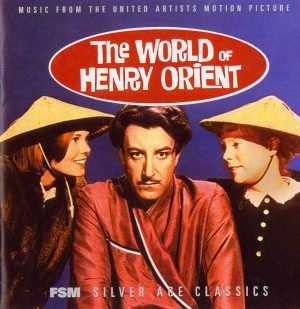Elmer BERNSTEIN
The World of Henry Orient
OST
FILM SCORE MONTHLY Vol 4 No. 16 [40:32]

Available from Film Score Monthly, 8503 Washington Boulevard, Culver City, CA90232; Tel: 1-888-345-6335; overseas: 310-253-9595; fax: 310-253-9588; Email: Info@filmscoremonthly.com
The World of Henry Orient (1964) starred Peter Sellars as an incompetent concert pianist and compulsive Lothario with a predilection for married women. He is the victim of a series of pranks played upon him by two young teenage girls determined to reform him.
Elmer Bernstein wrote a score that, like his music for To Kill a Mocking Bird, demonstrates how well he empathised with the world of childhood innocence. It is also a colourful, tongue-in-cheek melodic score full of fun and high spirits. The opening Main Title spills over with joyful, carefree charm much of the material in Latin American/Western mode that recalls Bernstein’s Magnificent Seven music and echoes the other Bernstein’s West Side Story figures. At other points in the story we hear exotic oriental figures as a play on the Sellar’s character’s name. One of the most amusing cues is Tuning/Concerto when Henry is soloist in a modern piano concerto (in which he manages to get himself hopelessly lost). Here Elmer Bernstein produces a clever irreverent take-off of a rambling avante garde concert work. Here are many moments of charming tenderness too, like the opening of ‘Sick Joke’ where the overlapping piano and woodwind phrases area characteristic Bernstein trait and capture the offbeat warmth of Gil, one of the girl’s household.
Bernstein in delightful light-hearted mode.
Ian Lace

John Huether is enthusiastic too:-
In my review of "Celluloid Copland" last March, I remarked how unique it was to find, after so many years, music by a leading American composer still unrecorded. Similarly, it’s amazing that this 1964 score by Elmer Bernstein is enjoying its first release only now, thanks to the good efforts of Lukas Kendall and his crew at Film Score Monthly. Consider: The early 1960s was a time of widespread soundtrack LP releases, and Elmer Bernstein was among the most-often recorded film composers. Beyond that, United Artists – which released "The World of Henry Orient" – was among the busiest studios in the soundtrack market.
How, then, did this subtle little gem manage to go largely ignored for nearly four decades?
What’s most remarkable about this score is how deftly Bernstein captures the characters of the story’s two protagonists -- a pair of 14 year-old girls. This is music of pure and gentle whimsy, cleverly orchestrated in the main title cue for accordion and guitar. As noted by Kendall and Jeff Bond in their liner notes, Bernstein has a gift for delineating the unique innocence of a child’s world — most famously, of course, Scout in "To Kill a Mockingbird," and here with Val and Gil, both teetering on the edge of young maturity as they romp through a New York City depicted here in a manner that, even for 1964, must have been more than a little fairytale-like.
This mood of gentle innocence extends throughout the score, interspersed frequently with overtly humorous music that range from a sort of mock-Asian/mysterioso theme (Val
and Gil occasionally dress in Chinese costume to eavesdrop on Peter Sellers, in the title role as a pompously incompetent concert pianist) to martial tempos and even, in ‘Arrest,’ a madcap circus-romp melody. Dramatic piano flourishes also help portray Sellers’ Lotharian character – as in ‘Rendezvous,’ in which the piano is by turns first romantic and then comedic as his intentions are foiled.
Contrasting wonderfully with all this is what the liner notes refer to as a "sunset" theme -- so named because even a first hearing puts one immediately in mind of the more expansive Western scores Bernstein was doing around this same time. This theme, generally carried on accordion also, underlines another aspect of the two girls’ friendship. It emerges most importantly late in the film in the cue ‘Father’ to underline Val’s relationship with her parent.
One intriguing cue is ‘Concerto,’ written for a scene in which a befuddled Sellers performs in concert with an orchestra of variously uninvolved musicians. As this piece had to be written prior to filming, when Bernstein unfortunately wasn’t available, it’s by Kenneth Lauber and what’s included here offers only those portions unaccompanied by dialogue. Its cleverness comes through all the same. In like manner, two source cues of lounge-type music are just light and infectious enough to be realistic without irritating.
Apart from an occasional echo from "The Great Escape" of one year previous, there is little in this score that is immediately recognizable as Bernstein —all the more remarkable considering that "Henry Orient" came in the midst of perhaps his most prolific period of film work. It also was the first of three films Bernstein worked on with
director George Roy Hill -- followed by "Hawaii" and "Thoroughly Modern Millie," the latter bringing Bernstein his only Academy Award. That two of these works are comedy scores is also interesting, coming as they did more than a decade before he entered that typecast phase of his career. (His least-noteworthy phase, I might add, although "Henry Orient" belongs in a class by itself.)
For his part, Bernstein has referred to "The World of Henry Orient" as a rock-oriented score, though the only such cue comes at the very end, where it slyly suggests what lies ahead for the two budding teenage girls. That may well have been enough, in 1964, to make the score unique. What stands out today, however, are its gentleness, whimsy and good humor.
No matter what else your Bernstein collection contains, it’s not complete without this one.
John Huether

Return to Index